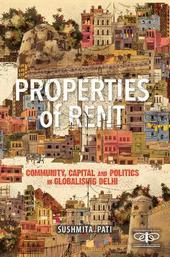
|
Properties of Rent: Community, Capital and Politics in Globalising Delhi
Hardback
Main Details
| Title |
Properties of Rent: Community, Capital and Politics in Globalising Delhi
|
| Authors and Contributors |
By (author) Sushmita Pati
|
| Series | Metamorphoses of the Political: Multidisciplinary Approaches |
|---|
| Physical Properties |
| Format:Hardback | | Pages:320 | | Dimensions(mm): Height 235,Width 155 |
|
| Category/Genre | Political economy |
|---|
| ISBN/Barcode |
9781316517277
|
| Classifications | Dewey:363.5095456 |
|---|
| Audience | | Tertiary Education (US: College) | |
|---|
| Illustrations |
Worked examples or Exercises
|
|
Publishing Details |
| Publisher |
Cambridge University Press
|
| Imprint |
Cambridge University Press
|
| Publication Date |
25 August 2022 |
| Publication Country |
United Kingdom
|
Description
We live in cities whose borders have always been subject to expansion. What does such transformation of rural spaces mean for cities and vice-versa? This book looks at the spatial transformation of villages brought into the Delhi's urban fray in the 1950s. As these villages transform physically; their residents, an agrarian-pastoralist community - the Jats - also transform into dabblers in real estate. A study of two villages - Munirka and Shahpur Jat - both in the heart of bustling urban economies of Delhi, reveal that it is 'rent' that could define this suburbanisation. 'Bhaichara', once a form of land ownership in colonial times, transforms into an affective claim of belonging, and managing urban property in the face of a steady onslaught from the 'city'. Properties of Rent is a study of how vernacular form of capitalism and its various affects shape up in opposition to both state, finance capital and the city in contemporary urban Delhi.
Author Biography
Sushmita Pati teaches political science at National Law School of India University, Bangalore. Her areas of interests are urban politics, political economy and political theory.
Reviews'Sushmita Pati reveals that the people at these embattled sites engage with the state's acquisition processes in unanticipated ways: they were neither always confrontational, nor merely resigned to their fates. Instead, the author uses life stories, court judgments, architectural forms, local political institutions and urban rental markets to provide a rich description, arguing that people often participated actively and purposefully in the process by which agricultural land became private urban property. This work should animate, for a long time to come, discussions about styles of urbanisation, economic growth and political forms of villages incorporated into the city.' Janaki Nair, author of Mysore Modern: Reconceptualising the Region under Princely Rule 'Pati's dexterous research and elegant prose takes us on an engaging journey through Delhi's 'urban villages' that shows us the importance of attending to the vernacularisation of capital through deeply situated dynamics of rent. We will be learning from this book for quite a while yet.' Sharad Chari, author of Fraternal Capital: Peasant-Workers, Self-Made Men, and Globalization in Provincial India 'Properties of Rent catalyses new thinking about the entanglements of land, labour and capital in urbanising India, the vital roles urban villages perform in Delhi's urban mosaic, and the neglected social life of rent in shaping cityscapes and caste futures. Desire, loss, alienation, violence and hope all collide in Pati's evocative book. Ethnographically rich and conceptually bold, Properties of Rent makes a range of provocative interventions, in debates spanning geographical political economy, anthropologies of capitalism and urban theory.' Vinay Gidwani, author of Capital, Interrupted: Agrarian Development and the Politics of Work in India
|